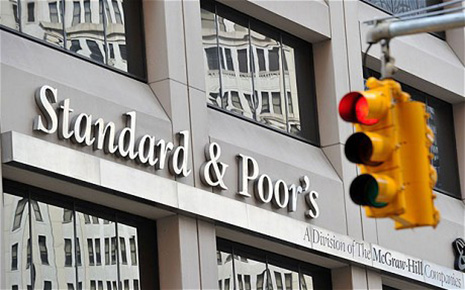S&P revised its outlook on Azerbaijan-based Muganbank OJSC to stable from positive. The `B-/C` long- and short-term counterparty credit ratings were affirmed.
Today`s rating actions follow the revision of our outlook on Azerbaijan to negative from stable.
Outlook was revised to negative on pressures from oil price decline; ВВВ-/А-3 ratings affirmed.
“In our opinion, economic risks for Azerbaijani banks have increased because of the slowdown of the domestic economy, due to the pronounced drop in international oil prices and sharp depreciation of the manat in early 2015,” the statement said.
As a result, under our methodology for banking industry and country risk, we now view the economic risk trend in Azerbaijan as negative, rather than stable. This reflects our opinion of increasing challenges that could constrain domestic banks` business growth and earnings prospects.
“We have affirmed our ratings on PASHA Bank because, in our view, the bank`s solid capital position counterbalances the pressures from deteriorating operating conditions,” the statement said. “We believe that, if the economy weakens further, the bank is likely to adjust its strategy, scaling back its growth and dividend payout.”
The bank`s loan book shows very high single-name concentration, with the 20 largest loans accounting for about 73% of total loans and 80% of total adjusted capital as of June 30, 2014. It is therefore vulnerable to worsening payment capacity of individual borrowers.
The stable outlook reflects our opinion that the bank`s risk-adjusted capital ratio will remain above 10% in the next 12-24 months, and asset quality deterioration would be only moderate and not exceed the sector average.
“We revised our outlook on Muganbank to stable from positive because we believe the more difficult operating environment, together with the manat`s depreciation and likely higher provisioning needs, could erode the bank`s earnings,” the statement said. “At the same time, we believe that the bank is continuing to strengthen its business position, and its track record in previous years is better than that of other domestic players.”
The stable outlook reflects our view that Muganbank`s experienced management team and market focus should help it navigate through the difficult economic conditions, even if the operating environment deteriorates further.
“We could take a negative rating action if we saw the bank`s funding and liquidity deteriorating significantly, or if its capital position came under more significant pressure that we currently expect,” the statement said. “We might take a positive rating action if we believed that in 2015 the bank can demonstrate healthy profitability, with a manageable increase in nonperforming loans, or if the operating environment were to improve.”
PASHA Bank is a leading corporate bank in Azerbaijan. Founded in 2007, the bank renders a wide range of corporate banking services, including the issuance of loans, transactions on the securities market, asset management and treasury services. Over 300 people work in PASHA Bank, represented by its head office and nine business centers.
PASHA Bank is a part of PASHA Group, a major investment-holding group in Azerbaijan, which also includes significant assets in insurance, property development, production of construction materials, tourism and other businesses. Kapital Bank, one of the largest retail banks in Azerbaijan, is also owned by PASHA Group.
The Muganbank OJSC, one of the well-known participants of Azerbaijani financial-banking industry, has been functioning since 1992.
The bank’s 44 branches and 6 sub-branches in Azerbaijan, as well as its representative office in Moscow, are effectively providing customers with all types of banking products.
Some 45 banks operate in Azerbaijan.
Azerbaijan’s banking sector refers to the group 8 according to the Banking Industry Country Risk Assessment (BICRA).
BICRA economic risk and industry risk scores are on a scale from 1 (lowest risk) to 10 (highest risk).
Story still developing
More about:
















































